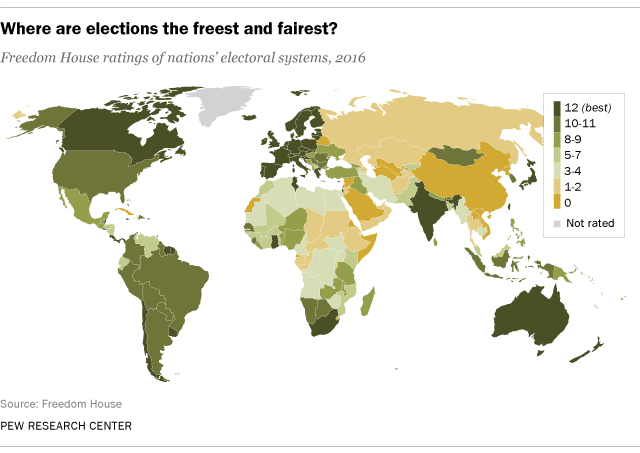As the long presidential campaign winds down, GOP nominee Donald Trump’s claims that the process is “rigged” against him – and suggestions that he might not accept the result as legitimate if he loses – seem to have struck a chord with his supporters. In a recent Pew Research Center survey, 56% of Trump voters said they have little or no confidence that the election will be “open and fair,” compared with 11% of Hillary Clinton backers. Among those who say they strongly back Trump, nearly two-thirds (63%) say they have little or no confidence that the election will be fair.
Given that level of skepticism, it’s worth noting that the U.S. generally ranks highly on the overall freedom and fairness of its elections when compared with other countries, though not without some caveats.
Freedom House, a nongovernmental organization (though it receives funding from the U.S. government), has ranked nations on political and civil rights for more than 40 years. In its most recent report, Freedom House gave the U.S. electoral process 11 out of 12 possible points on its “electoral process” scale – the same rating the nation has had since 2007 (when its score was raised from a 10).
The electoral process scale is one of seven that go into Freedom House’s overall ratings of countries as free, partly free or not free. It covers three major areas: whether the head of government or other chief national authority is chosen through free and fair elections; whether national legislators are chosen through free and fair elections; and whether a country’s electoral laws and framework are fair. Among the things that go into making elections “free and fair”: “Is the vote count transparent, and is it reported honestly with the official results made public?”
Of the 195 sovereign countries Freedom House ranked this year (using 2015 data), 61 scored 12 out of 12 on the group’s electoral process scale – among them Australia, Canada, Japan and the UK. Besides the U.S., 16 other countries received 11 points out of 12. Freedom House didn’t detail where the U.S. fell short, but commented in its report that “… its elections and legislative process have suffered from an increasingly intricate system of gerrymandering and undue interference by wealthy individuals and special interests.”
